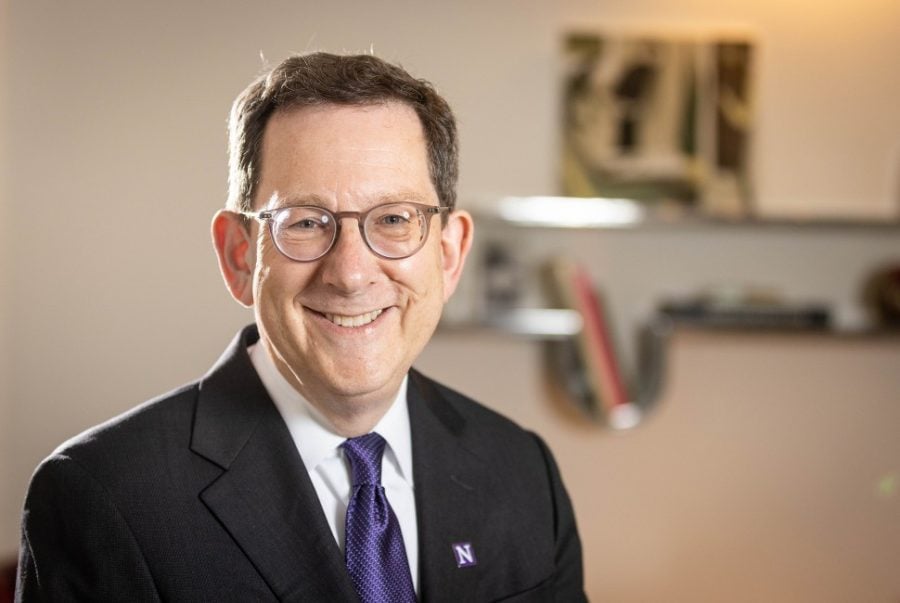Five things to know about University President Michael Schill
Photo courtesy of Northwestern Now
Michael Schill. Schill has spent decades in academia. What experiences could determine how he’ll navigate Northwestern?
October 16, 2022
University President Michael Schill has served in his role for just over a month after president-elect Rebecca Blank stepped down this summer. But what can his past tell us about what he might do as University president?
These are five things to know about Schill that may shape what kind of administrator he is.
He is a first-generation college student
Schill’s father worked in a clothing factory and his mother was a registered nurse, and neither went to college. But Schill has said he always dreamt of attending college.
He has said his first childhood memory was telling his father he would grow up and go to Harvard University, and his family had no doubt he would eventually attend college. The Harvard dream didn’t work out, but Schill ended up at two other Ivy League universities: Princeton University as an undergraduate and then Yale Law School.
Schill has said he prides himself on being a first-generation college graduate and wants to expand opportunities for other first-generation students at Northwestern.
As president of the University of Oregon, Schill donated his $76,000 bonus to a scholarship for first-generation students in 2018, and in 2021 helped launch a nationwide task force focused on expanding higher education opportunities.
He’s bounced around to a few different universities
Schill began his academic career as an assistant law professor at the University of Pennsylvania’s Carey Law and Wharton business schools, followed by New York University’s School of Law and Wagner Graduate School of Public Service.
He took his first administrative role in 2004 as dean of the University of California, Los Angeles’ School of Law, beginning a tenure of “high-quality leadership,” according to a statement by the then-chancellor and provost of UCLA.
Schill left UCLA in 2010 to serve as the dean of the University of Chicago School of Law. The chair of the search committee that ultimately chose Schill said they “hit the jackpot” with his selection, thanks to his career-long commitment to academia.
In 2015, he became president of Oregon at a time when the university was receiving less money from the state and risking losing its membership in the Association of American Universities, a group of institutions known for their research output. By the end of his tenure, though, the chair of Oregon’s Board of Trustees said Schill had transformed academics at the university.
His research explores urban planning
Schill has taken a vested interest in housing and planning in cities throughout this career. At NYU, Schill founded the law school’s Center For Real Estate and Urban Policy.
He has often researched the topic through the lens of New York City, investigating issues like the effect of homeownership programs on surrounding property values in the city.
Schill has also researched housing inequality — exploring how public housing changes local poverty rates and how the housing market affects the racial and socioeconomic makeup of different neighborhoods.
He’s had a shaky relationship with student activists
In 2017, Oregon students protested Schill’s State of the University speech, making enough of a commotion that Schill had to later post a pre-recorded version of the speech. The students expressed frustration with rising tuition costs, the oppression of historically marginalized students and an alleged rise of fascism and neo-Nazism that made campus unsafe.
Schill took to The New York Times’ op-ed pages to respond. He wrote that he didn’t disagree with the act of protest, but rather with what he saw as purposeful silencing of perspectives.
“Rather than helping people who feel they have little power or voice, students who squelch speech alienate those who are most likely to be sympathetic to their message,” he wrote.
Schill said he also found it ironic that students trying to fight fascism stopped a speech, since he believes free speech is fundamental to combat fascism.
He has a close relationship with his predecessors
Schill told The Daily last month that former University President Morton Schapiro has been very “generous” to him and that he’s a former student of Schapiro’s predecessor, Henry Bienen.
When at Princeton, Schill took a politics class with Bienen. Today, he holds the position Bienen eventually took on.
“They’ve both done incredible things for this University, moved it forward (in) different ways,” Schill said of his predecessors. “And I’m very grateful to both of them for their friendship and their advice.”
Email: [email protected]
Twitter: @GiangiulioDavis
Related Stories:
—Q&A: President-elect Michael Schill talks transition to Northwestern, previous experiences
—Michael Schill named next president of Northwestern
—Q&A: Julie Payne-Kirchmeier reflects on her time at Northwestern


